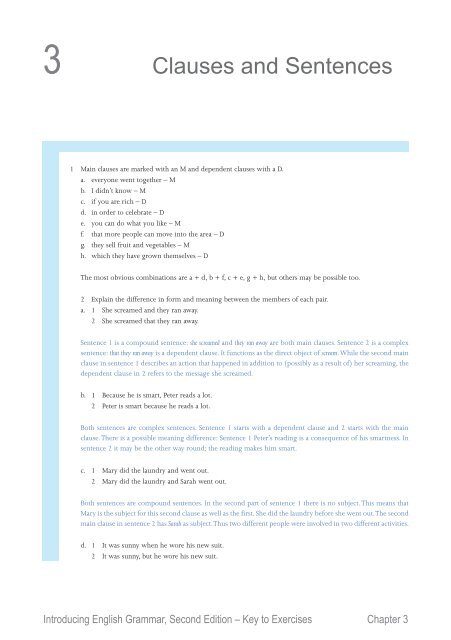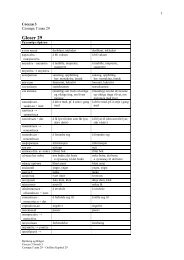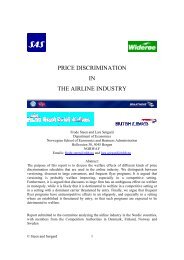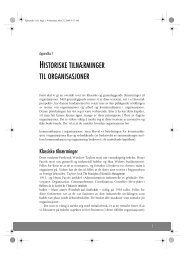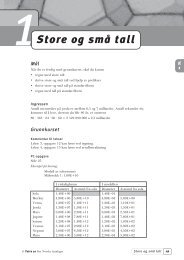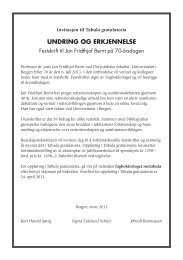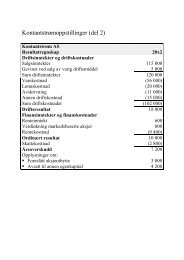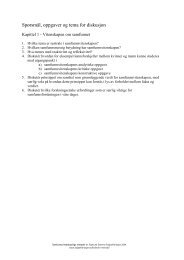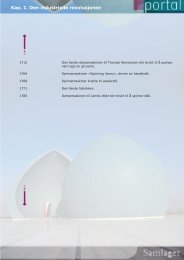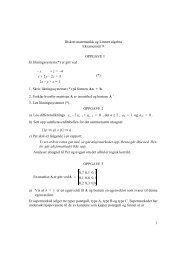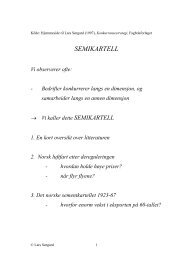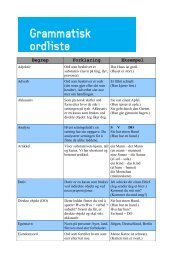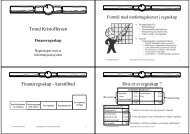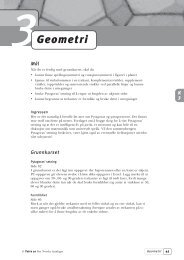3 Clauses and Sentences - Fagbokforlaget
3 Clauses and Sentences - Fagbokforlaget
3 Clauses and Sentences - Fagbokforlaget
You also want an ePaper? Increase the reach of your titles
YUMPU automatically turns print PDFs into web optimized ePapers that Google loves.
3 <strong>Clauses</strong> <strong>and</strong> <strong>Sentences</strong>1 Main clauses are marked with an M <strong>and</strong> dependent clauses with a D.a. everyone went together – Mb. I didn’t know – Mc. if you are rich – Dd. in order to celebrate – De. you can do what you like – Mf. that more people can move into the area – Dg. they sell fruit <strong>and</strong> vegetables – Mh. which they have grown themselves – DThe most obvious combinations are a + d, b + f, c + e, g + h, but others may be possible too.2 Explain the difference in form <strong>and</strong> meaning between the members of each pair.a. 1 She screamed <strong>and</strong> they ran away.2 She screamed that they ran away.Sentence 1 is a compound sentence: she screamed <strong>and</strong> they ran away are both main clauses. Sentence 2 is a complexsentence: that they ran away is a dependent clause. It functions as the direct object of scream. While the second mainclause in sentence 1 describes an action that happened in addition to (possibly as a result of) her screaming, thedependent clause in 2 refers to the message she screamed.b. 1 Because he is smart, Peter reads a lot.2 Peter is smart because he reads a lot.Both sentences are complex sentences. Sentence 1 starts with a dependent clause <strong>and</strong> 2 starts with the mainclause. There is a possible meaning difference: Sentence 1 Peter’s reading is a consequence of his smartness. Insentence 2 it may be the other way round; the reading makes him smart.c. 1 Mary did the laundry <strong>and</strong> went out.2 Mary did the laundry <strong>and</strong> Sarah went out.Both sentences are compound sentences. In the second part of sentence 1 there is no subject. This means thatMary is the subject for this second clause as well as the first. She did the laundry before she went out. The secondmain clause in sentence 2 has Sarah as subject. Thus two different people were involved in two different activities.d. 1 It was sunny when he wore his new suit.2 It was sunny, but he wore his new suit.Introducing English Grammar, Second Edition – Key to Exercises Chapter 3
Sentence 1 is complex <strong>and</strong> contains the dependent clause when he wore his new suit. Sentence 2 is compound. Thesecond main clause is introduced by the co-ordinating conjunction but. The meaning of 1 is that the sun wasshining at the time when he wore his new suit. Sentence 2 means that he wore his new suit in spite of the sun– maybe the suit would normally be considered too warm in sunny weather.3 Read the following text <strong>and</strong> answer the questions below:(i) The Mondana “school bus” picks up dozens of children every morning along the banks of the River Napo.(ii) The Napo flows from Ecuador into the Amazon. (iii) It’s one of the Amazon’s greatest tributaries, <strong>and</strong> inMondana it’s also the local highway. (iv) There are very few roads deep in the rainforest. (v) Without the schoolcanoe, most of these children would miss out on an education altogether because the journey to school wouldbe too difficult. (vi) But last year a road was built across the river from the school, through the village. (vii)Lizbeth, age 17, lives next to the new road with her mother Rosa. (viii) Now Lizbeth <strong>and</strong> her family can catchthe bus to the local market town, which has changed their lives.a. Subjects are marked with green <strong>and</strong> verbals with red in sentences (i), (ii), (vii) <strong>and</strong> (viii).b. Only sentence (iii) is a compound sentence.c. Dependent clauses in the text have been underlined.4 Answers based on the British National Corpus at http://corpus.byu.edu/.a. Because seems to occur most often later in the sentence, but is not uncommon in the beginning of sentenceseither.b. Especially some of the sentences that start with because are incomplete sentences, such as Because I like it. Thisis a dependent clause that occurs on its own, <strong>and</strong> is thus an incomplete sentence.c. 17 instances of the word sentence probably refer to its grammar/linguistics sense (one or two are a bit unclearin their meaning). Three refer to prison sentences.d. The great majority of the phrase main clause occur in texts about grammar/linguistics. But there is at least onefrom a legal text, where clause means “part of a legal document or law that officially states that somethingmust be done” (definition from Macmillan Dictionary).Introducing English Grammar, Second Edition – Key to Exercises Chapter 3


